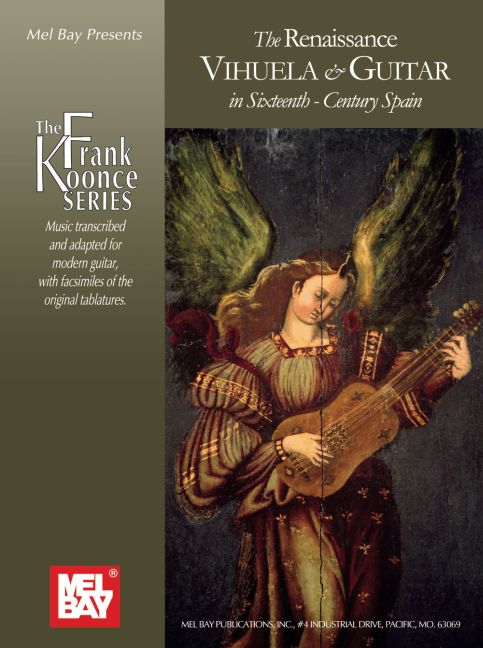The Renaissance vihuela & guitar in 16th century Spain
Description
Scholarly editions, which serve different purposes than
performance editions, are not often designed with the modern
guitarist in mind. For instance, Renaissance vihuela tablatures are
usually transcribed with the open first string as G, not E. Most
are presented in double-staff notation, a medium that is superior
for realizing counterpoint but unconventional as guitar notation.
Furthermore, these editions sometimes give idealized, but not
realistic, solutions for voicing, note duration, and other matters
that need to be considered within the limitations of our
instrument. Guitarists who try to play from these editions
essentially are faced with the task of transcribing the
transcription!
It includes representative selections, edited for modern guitar,
from the seven books for vihuela that were published in Spain
between 1536 and 1576.
As well as being fun and entertaining music for all to enjoy, these
collections are intended to help bridge the gap between scholarly
editions and performance editions by providing a hands-on
introduction to tablature transcription and to issues concerning
historically informed performance of early music on the guitar.
A 188-page anthology, edited for modern guitar, from the seven
books for vihuela that were published in Spain between 1536 and
1576 A companion volume to The Baroque Guitar in Spain and the New
World (MB21122) Intended to help bridge the gap between scholarly
editions and performance editions An introduction to tablature
transcription and to issues concerning historically informed
performance of early music on the modern guitar.
Content :
- Development of the Vihuela and Guitar
- Tunings of the Vihuela and the Guitar
- Surviving Instruments
- Reading and Transcribing Tablature
- Theory and Performance Practice
- Editorial Procedures
- Luis Milán
- Fantasía 1
- Fantasía 3
- Fantasía 10
- Fantasía 11
- Fantasía 16
- Pavanas 2, 4, 6
- Durandarte
- Luis de Narváez
- Fantasía 14
- Canción de Nicolas Gombert
- Mille Regretz (Canción del Emperador)
- Cuatro diferencias sobre Guárdame las vacas
- Otras Tres diferencias sobre Guárdame las vacas
- Baja de contrapunto
- Ya se sienta el Rey Ramiro
- Veintidós diferencias sobre Conde Claros
- Alonso Mudarra
- Fantasía 1
- Pleni sunt de la Missa Faysan regretz de Josquin
- Diferencias sobre Conde Claros
- Pavana de Alexandre
- Gallarda
- Fantasía 10
- Piezas del Tercero Tono
- Triste estaba el rey David
- Isabel, perdiste la tu faja
- Enríquez de Valderrábano
- Fantasía 1
- Fantasía 19
- Soneto
- Soneto Lombardo a manera de danza
- Agnus Dei de Cristóbal de Morales
- Siete diferencias fáciles sobre Guárdame las vacas
- Diego Pisador
- Pavana
- Decirle al caballero
- Si la noche hace oscura
- ¿Y con qué la lavaré?
- Miguel de Fuenllana
- Duo
- Fantasía 27
- Tant que vivray
- ¿Con qué la lavaré?
- De Antequera sale el moro
- Fantasía 40
- Fantasía 46
- Fantasía 51
- Esteban Daza
- Fantasía 12
- Fantasía 21
- Fantasía 22
- Nunca más verán mis ojos
